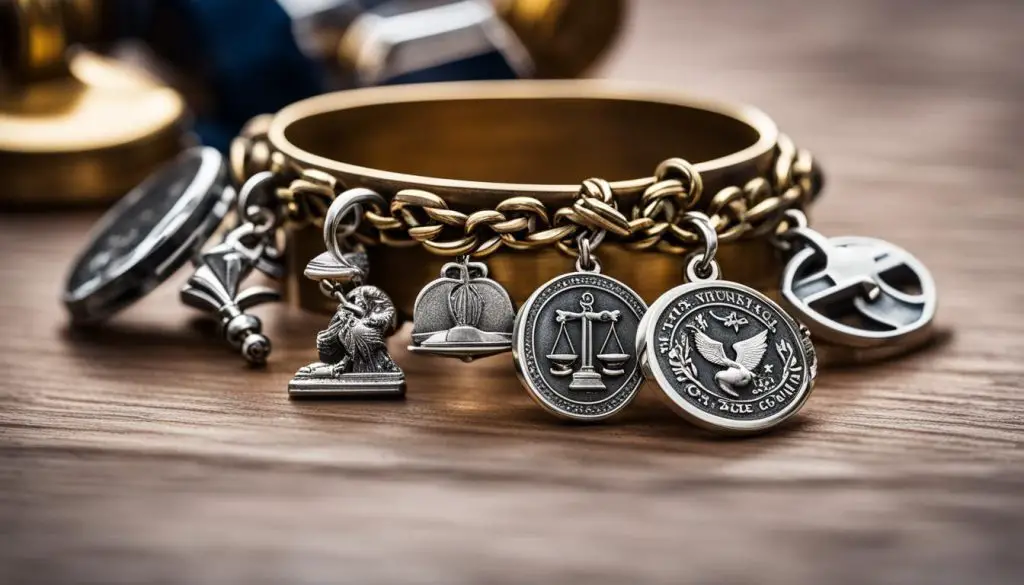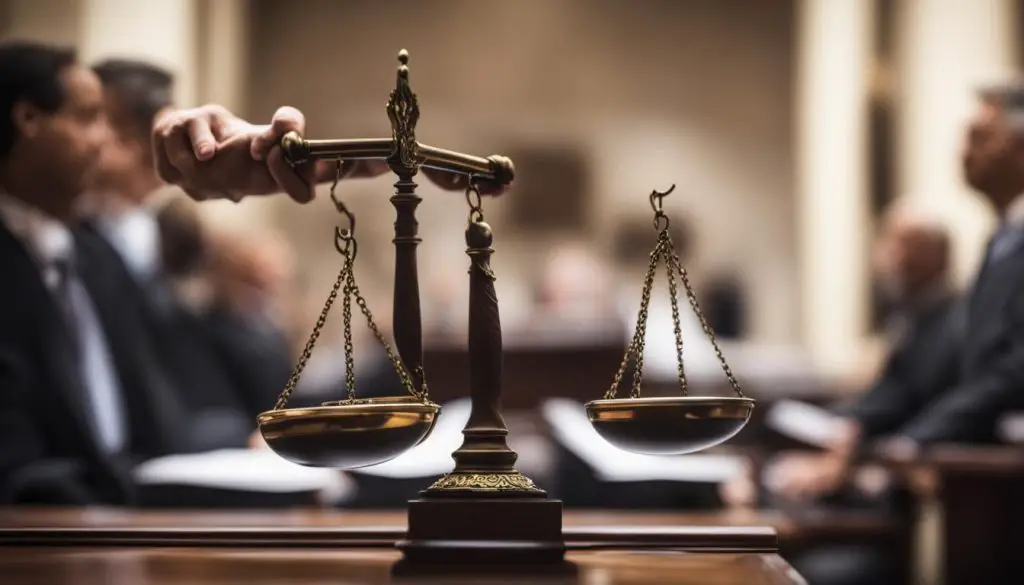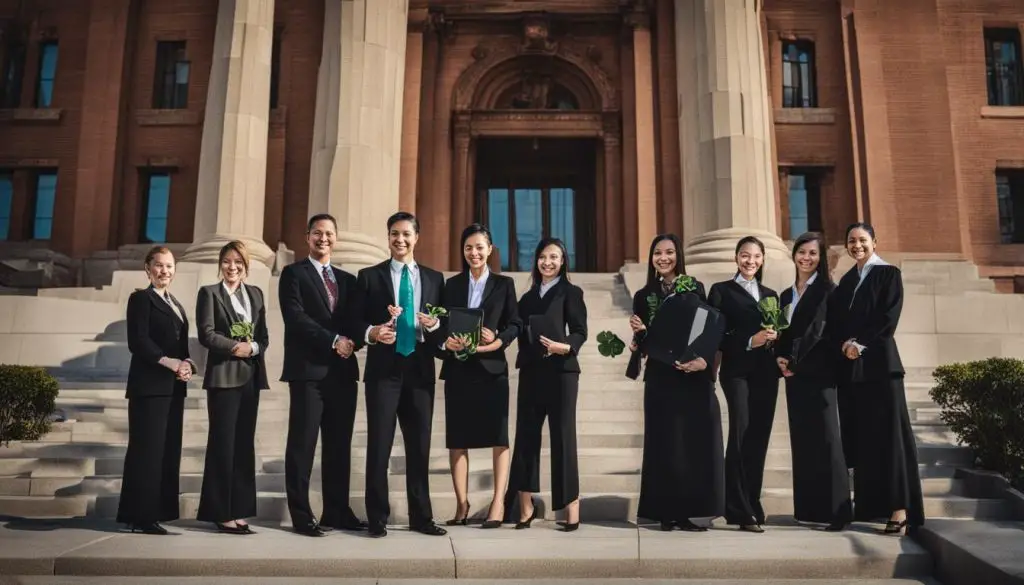Wishing someone good luck in court can be a thoughtful gesture, but it’s important to know the appropriate timing and ways to convey your well-wishes. Before the court date, you can wish a lawyer friend success before the hearing. However, it’s best to refrain from making any comments once the negotiation is underway. Avoid addressing the defendant, plaintiff, attorney, judge, jury, or witness directly in the courtroom. Instead, use non-verbal methods or discreetly whisper your wishes. It’s important to maintain decorum and observe court rules to avoid any disruptions.
Contents
- 1 Wishing Good Luck to the Defendant or Plaintiff
- 2 Wishing Good Luck to the Attorney
- 3 Saying Good Luck to a Judge in a Professional Manner
- 4 Wishing a Member of the Jury or a Witness Good Luck
- 5 Typical Phrases to Say Good Luck in Court
- 6 Non-Verbal Ways to Say Good Luck to Someone in a Courtroom
- 7 What Not to Do
- 8 Final Thoughts
- 9 FAQ
- 9.1 Can I wish a lawyer good luck before their court hearing?
- 9.2 Can I address the defendant or plaintiff directly to wish them good luck?
- 9.3 Can I wish an attorney good luck during a court session?
- 9.4 Can I wish a judge good luck before or during a court session?
- 9.5 Can I wish a member of the jury or a witness good luck?
- 9.6 What are some typical phrases to wish good luck in court?
- 9.7 How can I convey good luck non-verbally in a courtroom?
- 9.8 What behaviors should I avoid when expressing good luck in a courtroom?
- 9.9 How should I express good luck to lawyers and legal professionals?
- 10 Source Links
Key Takeaways:
- Wishing lawyers success in court requires proper timing and discretion.
- Avoid addressing anyone directly in the courtroom.
- Use non-verbal methods or discreet whispers to convey your good luck wishes.
- Respect court rules and maintain decorum to avoid disruptions.
- Remember to be mindful of attorneys’ superstitions and busy schedules.
Wishing Good Luck to the Defendant or Plaintiff
When it comes to expressing your good luck wishes to a defendant or plaintiff, it’s important to choose the right moment. Before the court case begins, you can offer your words of encouragement to both parties. However, it’s crucial to be mindful of the specific circumstances surrounding civil cases and criminal cases.
In civil cases or lawsuits, you can wish the defendant good luck before the judge takes the seat. This can be done discreetly by approaching them before the formal proceedings begin. However, for criminal cases, it is not appropriate to address the defendant directly. Instead, wait for eye contact and offer a nod or a smile as a nonverbal way of conveying your good luck wishes.
Remember to maintain a respectful and professional demeanor throughout, as courtrooms are formal settings that demand decorum.
Table: Examples of Non-Verbal Ways to Say Good Luck
| Non-Verbal Gesture | Description |
|---|---|
| Nod and Smile | Offer a nod and a smile when making eye contact with the defendant or plaintiff to convey your good luck wishes. |
| Thumbs Up | Use a thumbs-up gesture to silently express your support and well wishes. |
| Hand on Heart | Place your hand over your heart to symbolize your sincere wishes for success. |
| Waving Fingers | Subtly wave your fingers in the direction of the defendant or plaintiff as a gesture of goodwill. |
By using these non-verbal gestures, you can express your good luck wishes in a respectful and appropriate manner while avoiding any disruptions in the courtroom.
Wishing Good Luck to the Attorney
When it comes to conveying best wishes to legal practitioners, it’s essential to be mindful of their superstitions and busy schedules in the courtroom. While it’s generally okay to wish an attorney good luck, it’s crucial to do so at the right time and in the right manner to avoid any disruptions. Attorneys often have specific rituals or beliefs, so it’s best to understand their preferences before expressing your good luck wishes. Be respectful of their time and workload, especially once the court is in session.
Interrupting an attorney while they are speaking with other court personnel is not advisable. They may be discussing important matters related to the case or strategizing with their colleagues. Therefore, it’s important to wait for an appropriate moment to convey your well wishes. Respect their space and avoid any actions that could potentially distract or disturb them.
Nonverbal cues can also be used to wish an attorney luck discreetly. If you have eye contact with them during a break or when they are not actively engaged in a conversation or argument, you can offer a subtle nod, smile, or a thumbs-up as a sign of support. These gestures can convey your good luck wishes without disrupting the courtroom proceedings.

Table: Superstitions of Attorneys
| Superstition | Meaning |
|---|---|
| Carrying a lucky charm | Believed to bring good fortune and positive energy |
| Wearing a specific item of clothing | Thought to enhance confidence and success in court |
| Following a specific pre-trial routine | Believed to create a sense of familiarity and control |
| Avoiding certain words or phrases | Thought to prevent bad luck or negative outcomes |
Understanding and respecting these superstitions can help you navigate the art of conveying best wishes to legal practitioners effectively. By doing so, you can show your support and help create a positive environment in the courtroom.
Saying Good Luck to a Judge in a Professional Manner
When it comes to expressing good luck to a judge, it’s important to do so in a professional and respectful manner. As a courtroom observer, your focus should be on maintaining decorum and adhering to the rules of the court. While it may be tempting to verbally wish the judge good luck, it’s best to avoid any direct communication once the court session begins. Instead, there are alternative ways to convey your well wishes without being disruptive.
Non-verbal gestures: Non-verbal methods are an appropriate way to express your good luck wishes to a judge. If you happen to know the judge handling the case and they make eye contact with you, a respectful nod or smile can be an acknowledgement of your support. However, it’s crucial to maintain silence and avoid any distracting behavior during the proceedings. Remember, the focus should remain on the legal process and not individual interactions.
Respectful demeanor: It is essential to maintain a respectful and professional demeanor in the courtroom. This includes refraining from any outbursts, shouting, or disruptive actions that may interfere with the proceedings. It’s best to avoid any sudden movements or obnoxious non-verbal modes of communication that may distract or cause a disturbance. By conducting yourself with utmost respect and decorum, you contribute to a conducive environment for the judge, attorneys, and all parties involved.
| Do’s | Don’ts |
|---|---|
|
|
By adhering to these guidelines, you can show your support and good luck wishes to a judge in a professional and appropriate manner. Remember, the courtroom is a place of formality and respect, and it is important to maintain the integrity and decorum of the legal process.
Wishing a Member of the Jury or a Witness Good Luck
When it comes to wishing a member of the jury or a witness good luck during a case, it is important to exercise caution and maintain the integrity of the legal process. It is not recommended to communicate directly with them or express your good luck wishes while the trial is ongoing. Attempting to interact with them in any way may be seen as compromising their neutrality and impartiality, which could result in legal consequences.
However, if you happen to know the person who is serving as a member of the jury or as a witness, you can offer your good luck wishes before their appearance in court. This can be done outside the courtroom, in a private and non-intrusive manner. Keep in mind that it’s important to respect their role in the legal proceedings and avoid any communication or interference that may disrupt the fairness of the trial.
As a spectator or a supporter of the legal process, it is best to refrain from any direct interactions with the members of the jury or the witnesses. Instead, focus on showing your support by maintaining a respectful and attentive presence in the courtroom. Let the legal professionals fulfill their roles without any interference, and trust that the system will work to ensure a fair and just outcome.
Remember: It’s crucial to respect the legal proceedings and avoid any actions that may compromise the integrity of the trial. Express your good luck wishes in a responsible and non-intrusive manner and maintain a respectful presence in the courtroom.
| Do’s | Don’ts |
|---|---|
|
|
Typical Phrases to Say Good Luck in Court
When it comes to wishing good luck in court, there are several typical phrases you can use to convey your well wishes. These phrases are simple yet effective in expressing your support for lawyers and legal professionals. Here are some examples:
“Best wishes!”
“Many blessings!”
“I wish you luck”
“All the best!”
“Take care”
“Godspeed!”
“Fingers crossed!”
“Wishing you lots of luck”
“You are going to be amazing”
“Everything will work out”
Choose a phrase that resonates with you and the person you’re wishing luck to. These words of encouragement can provide a positive mindset and boost confidence for lawyers heading into court proceedings.

Non-Verbal Ways to Say Good Luck to Someone in a Courtroom
When it’s not appropriate to speak in the courtroom, there are still non-verbal methods you can use to convey your good luck wishes to attorneys. These gestures and cues can help you show your support without disrupting the proceedings or compromising the decorum of the court. Here are some non-verbal ways to send good luck to attorneys:
- Nodding and smiling discreetly: A simple nod or smile can go a long way in conveying your well wishes without drawing attention to yourself.
- Wearing a symbol: If you know that a particular symbol holds significance for the attorney, you can wear it discreetly as a way to send good luck vibes.
- Crossed fingers: Holding up crossed fingers is a common gesture that signifies good luck. You can subtly do this to silently communicate your well wishes.
- Subtle hand or finger motions: You can wave your hands or fingers subtly to send good luck vibes without being obnoxious or disruptive.
Remember, it’s essential to be respectful and considerate when using non-verbal methods to convey your good luck wishes. You want to show your support while maintaining the solemnity and professionalism of the courtroom environment.

What Not to Do
When it comes to expressing good luck to lawyers, there are certain things you should avoid doing in a courtroom setting. It’s important to maintain a polite and respectful demeanor at all times to avoid any disruptions or negative consequences. Here are some key behaviors to steer clear of:
- Shouting, yelling, or raising your voice: These actions are never appropriate inside a courtroom and can be seen as disruptive.
- Making strange noises or inappropriate facial expressions: It’s important to maintain a professional and composed demeanor to show respect for the proceedings.
- Jumping up and down or using obnoxious nonverbal communication: These actions can distract and disrupt the focus of the court.
- Mouthing words or sighing loudly: These behaviors can be seen as disrespectful and can be interpreted negatively by the court.
- Blurting out “good luck” once the judge has entered the courtroom: It’s important to adhere to the appropriate timing and decorum of the court.
Remember, the courtroom is a formal and professional environment, and it’s crucial to show respect for all parties involved. By avoiding these behaviors, you can ensure that your well wishes are expressed in a thoughtful and appropriate manner.

Table: Behaviors to Avoid in the Courtroom
| Behavior | Explanation |
|---|---|
| Shouting, yelling, or raising your voice | These actions can disrupt the proceedings and show disrespect. |
| Making strange noises or inappropriate facial expressions | It’s important to maintain a professional demeanor and not distract from the court’s focus. |
| Jumping up and down or using obnoxious nonverbal communication | These actions can be disruptive and disrespectful to the court and its participants. |
| Mouthing words or sighing loudly | These behaviors can be interpreted negatively and show a lack of respect. |
| Blurting out “good luck” once the judge has entered the courtroom | Timing is important, and it’s crucial to adhere to the court’s decorum. |
Final Thoughts
Expressing good luck to lawyers and legal professionals requires tact, observation, and understanding of courtroom etiquette. It’s important to be mindful of the appropriate timing and methods for conveying your well wishes.
Whether it’s before the court date, through non-verbal cues, or discreet whispers, find a way to show your support while maintaining decorum in the courtroom. Remember to respect the rules and obligations of all parties involved and avoid any disruptive behavior.
By expressing good luck to lawyers and legal professionals in a respectful manner, you can contribute to a positive and supportive environment in the courtroom. Your well wishes can provide motivation and encouragement as they navigate the complexities of the legal system.
FAQ
Can I wish a lawyer good luck before their court hearing?
Yes, it is appropriate to wish a lawyer good luck before their court hearing as a thoughtful gesture of support.
Can I address the defendant or plaintiff directly to wish them good luck?
It is not recommended to address the defendant or plaintiff directly in the courtroom. Instead, use non-verbal methods or discreet whispers to convey your good luck wishes.
Can I wish an attorney good luck during a court session?
While it is generally okay to wish an attorney good luck, it is best to avoid interrupting them if they are speaking with other court personnel. Be mindful of their time and workload.
Can I wish a judge good luck before or during a court session?
It is best to wish a judge good luck well before the court session begins. Avoid addressing the judge during the proceedings, especially when they are speaking.
Can I wish a member of the jury or a witness good luck?
It is not recommended to interact with members of the jury or witnesses during the trial as it may compromise their neutrality. If you know them personally, you can offer your good luck wishes before their appearance.
What are some typical phrases to wish good luck in court?
Some examples include “Best wishes!”, “Many blessings!”, “I wish you luck”, “All the best!”, “Take care”, “Godspeed!”, “Fingers crossed!”, “Wishing you lots of luck”, “You are going to be amazing”, and “Everything will work out”.
How can I convey good luck non-verbally in a courtroom?
Nodding and smiling discreetly can be a way to convey your well wishes without disrupting the proceedings. You can also wear a symbol that holds meaning for the person or subtly use hand gestures.
What behaviors should I avoid when expressing good luck in a courtroom?
Avoid shouting, yelling, raising your voice, making strange noises, using inappropriate facial expressions, jumping up and down, using obnoxious nonverbal modes of communication, mouthing words, sighing loudly, or blurting out “good luck”. Maintain a polite and respectful demeanor at all times.
How should I express good luck to lawyers and legal professionals?
It is important to be mindful of the appropriate timing and methods for conveying your well wishes. Find ways to show support while maintaining decorum in the courtroom and respecting the rules and obligations of all parties involved.





